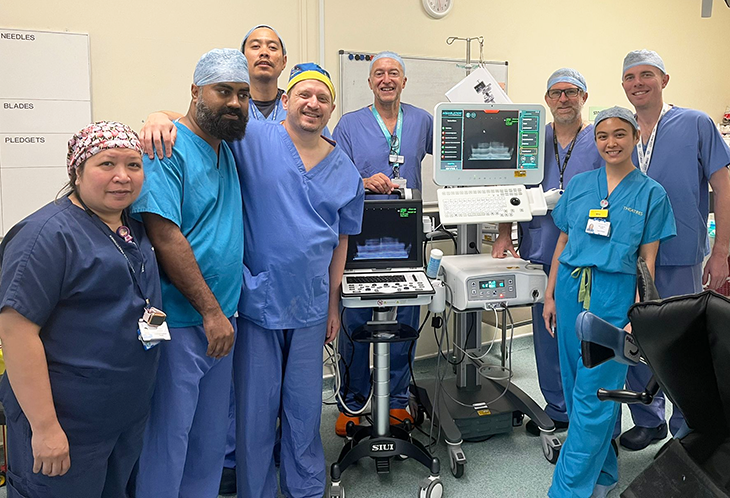Last month, two of our consultant urologists, Mr Edward Calleja and Mr Kamil Quraishi, successfully performed our first aquablation procedures at Eastbourne District General Hospital.
This makes us one of the first NHS Trusts in the region to provide this advanced technology and marks a significant advancement in the treatment of benign prostatic hyperplasia (BPH), more commonly known as an enlarged prostate.

Aquablation therapy is a new, minimally invasive treatment that uses robotic technology and a high-pressure water jet guided by ultrasound and camera images to remove excess prostate tissue that is blocking urine flow.
It offers several key advantages over traditional treatments for an enlarged prostate, as it:
- preserves ejaculation in 81-89% of men
- offers a significantly reduced operating time compared to traditional surgical methods (which also means more patients can be treated in a single theatre list, helping to reduce waiting times and improve access to care), and;
- as surgical expertise grows, aquablation can increasingly be performed as a day-case procedure, meaning most patients can go home the same day – improving patient experience, lowering healthcare costs and making more efficient use of hospital beds.
Mr Edward Calleja, Consultant Urologist, said: “While BPH is not a form of cancer, it can cause troublesome symptoms, particularly to the way men urinate. We are thrilled to be able to offer aquablation to our patients. The milestone demonstrates our commitment to offering cutting-edge, patient-friendly treatments for common urological conditions affecting men, especially those that become more prevalent with age.”
BPH affects about 50% of men over 50 and 80% of men over 70. Its symptoms can significantly affect quality of life.
The prostate is a small gland, roughly the size of a walnut, found only in men. It sits just below the bladder and surrounds the urethra – the tube that carries urine from the bladder out of the body.
The prostate plays a vital role in male reproduction by producing a fluid that nourishes and protects sperm.
As men age, it is common for the prostate to become enlarged. Symptoms include:
- A weak or slow urine stream
- Needing to urinate more often, especially at night (this is known as nocturia)
- Difficulty starting urination
- Feeling that your bladder has not fully emptied
- A sudden, urgent need to urinate
- In some cases, complete blockage of urine flow (urinary retention)
Aquablation may be recommended for men who:
- Have moderate to severe urinary symptoms due to BPH
- Have a large prostate or who are not suitable for traditional treatments
- Want to preserve sexual function
- Prefer a robot-assisted, minimally invasive option
Suitability is determined by a urology specialist after assessing your symptoms, prostate size imaging estimation, and flow tests.
If you’re experiencing symptoms of an enlarged prostate, visit your GP and request a referral to our urology team.
